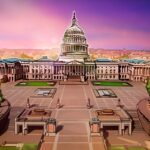
July 10, 2025
Books are way more than just words on a page. Stories can help us make sense of the world, figure out who we are and feel less alone. For teens, this can be especially important. Whether it’s about better understanding our identities, learning about friendships or exploring mental and sexual health, books can provide a safe space to learn without being judged.
Book bans have long been a tactic used to limit and censor information, but they’ve been on the rise in recent years. Factors for this include the influence and reach of social media and pressures from small but vocal minority conservative groups.
This is why New Jersey’s recent decision to take a stance against book bans is such a big deal.
Ensuring Access to Books
The Freedom to Read Act, passed by NJ lawmakers in late 2024, guarantees that NJ schools and libraries can’t ban books just because someone thinks they’re offensive. With this law, books cannot be removed based on the origin, background or views they represent. The act “prevents arbitrary book banning and protects the rights of students, parents and communities to have free access to age-appropriate books and learning materials at schools and public libraries,” according to an official statement. Importantly, it also provides protection for library staff members against lawsuits and harassment related to complying with this law.
Local school boards and public libraries are now required by law to create policies for managing library materials, which includes a review process to handle any concerns about those materials, ensuring a consistent way to review any complaints, as opposed to an automatic expectation to remove something based on someone’s reaction.
Organizations like the Department of Education, the State Librarian, the New Jersey Association of School Librarians and the New Jersey School Boards Association will help in setting up these policies.
Impact on Teen Health
Book bans can affect young people in significant ways. A lot of titles that people have banned or attempted to ban deal with topics like race, sexual identity, gender identity and mental health. In fact, of the most common banned books of the 2023-2024 U.S. school year, 36 percent feature characters of color and 25 percent feature LGBTQ+ characters, according to PEN America, an organization that protects the free expression to read and write. In addition, 10 percent feature characters who are neurodivergent or disabled.
Lack of access to books with diverse characters can lead to feelings of isolation, stemming from not having role models or anyone with a similar culture or experience to read about. Book bans shut down important discussions and can make teens feel like their experiences are invalid or not worth understanding.
Topics like the ones mentioned above affect many people, but teens may not always feel comfortable discussing or exploring them with others. They may feel confusion or shame asking questions. Being able to read honest and trustworthy information can make a huge difference.
Plus, books that talk about sexual health can give accurate details about things like consent, relationships and safer sex. If teens don’t have access to these kinds of resources, they might look for information in places that aren’t trustworthy. Or, they might feel embarrassed about their questions and not know where to turn.
Standing Up to Censorship
New Jersey’s decision to protect the right to read is part of a larger trend. It follows other states which have created or initiated similar laws in response to the rise in book bans. These bans often focus on books written by or about marginalized groups, sending a harmful message that these voices don’t belong.
With the Freedom to Read Act, NJ is empowering readers and standing up against censorship. The law highlights the importance of access to different ideas and perspectives.
The Freedom to Read Act shows NJ teens that their state cares about their ability to discover, learn and develop without facing unnecessary obstacles or feeling ashamed of their desire to know and understand more about themselves and others.








